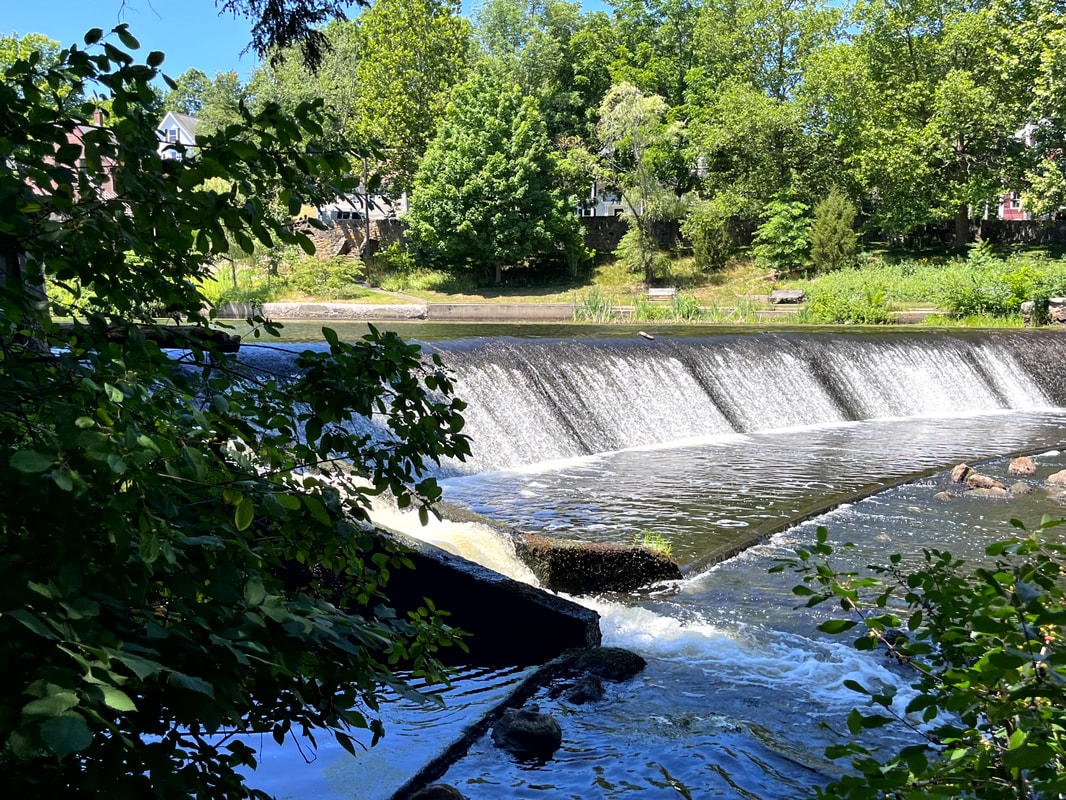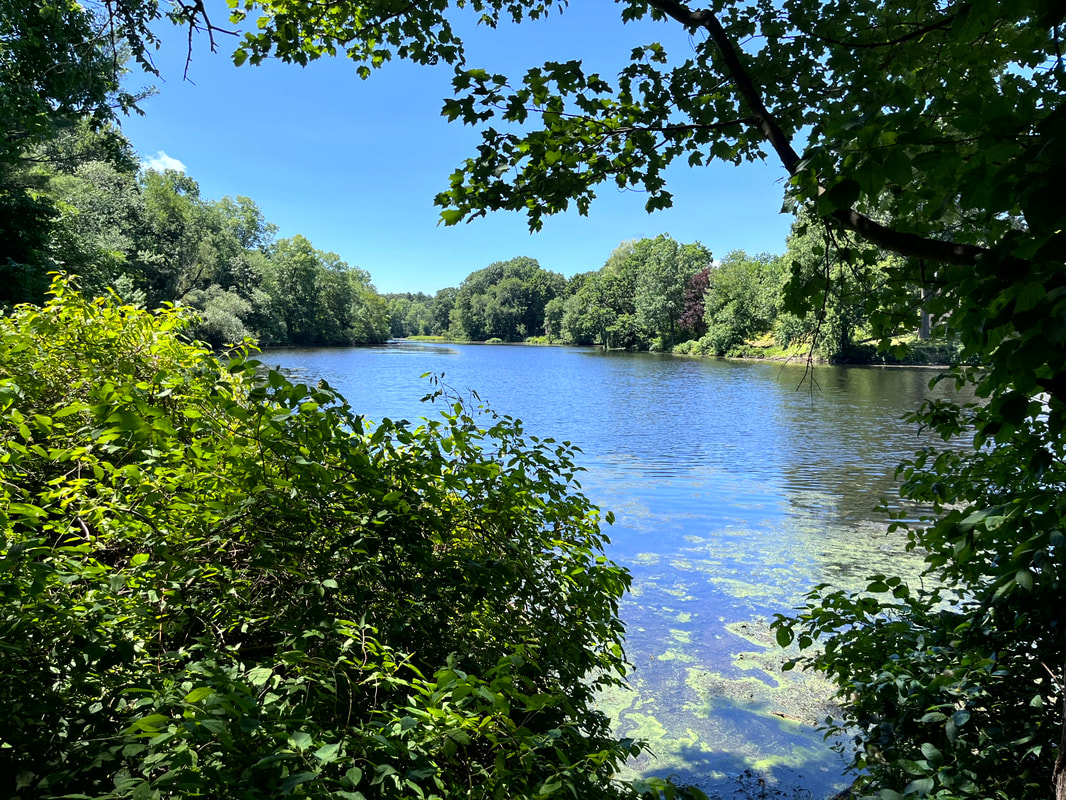|
I was out in my garden this morning harvesting potatoes and then planting squash and peppers in their place. They are an experiment. Everything is an experiment these days. While I hope they grow and create food for my labor I do not expect it. I do it because I like being outside, even in this heat, taking part in the ecosystem around me. Its not like a hiking trip at all. However, in the midst of the constant sound and presence of cars, lawnmowers, walkers, and leaf blowers there is some nature to be had. It is in the garden and under the trees where the landscaper doesn't go. Sometimes, it is in the sound of the river that runs just across the street. The Charles River (called the "Quinobequin" in Algonquin) here in Natick is a catalyst for argument these days. You see, there is the issue of the dam (an earthen barrier referred to more often as a park) and the spillway (a concrete barrier colloquially referred to as a dam). Regulators say that something must be done. It is unsafe as it is and the solution comes down to repair of the spillway--which would require removing all the trees (and therefore the ecosystem) in the park--or removal of the spillway (which would mean restoring the flow of the river and lowering the water level above it as well as taking away our tiny waterfall). Emotions are high. It will be a change either way and people are rarely comfortable with change. I feel it too. I know that--after the better part of two decades living here--whatever will happen will feel a little bit like a loss to me. I have raised my children by the river. We have paddled as far as we could manage both upstream and down. I walk past it many times each day and wave to the people I know enjoying their coffee and watching the water go by. I have sat by the spillway with family, friends, and congregants having some fairly momentous conversations. I have made observations concerning the local flora and fauna here in the weblog. I will miss the way it is now and am grieving what is to come. I have friends on both sides of this debate--repair v. removal--and I understand why people feel so strongly about this issue. We are talking about our home and our homes. However, things have gotten heated in some quarters in ways that reflect the current political landscape. No doubt they will continue to be. On the social networks (which I am not fond of but have to use) it seems that we cannot help but slide a bit from finding our way together into devaluing the opinions of others. There is lots of snark these days. There are arguments about whose opinion "matters most." Just like on the national stage each side even has a different language for the discussion. I will tell you my opinion, but fellow Natickites already know it because I used the word "spillway" instead of "dam" to describe...um...well...the spillway. I have recently noticed that most (but not all) of my neighbors have put up signs in favor of maintaining the spillway in South Natick. This does not surprise me. I will not hazard specific reasons because they can speak for themselves. It is a nice spot and--as I described above--part of a profound set of memories and connections for all of us who live on its banks. That said, I cannot agree with them. I am in favor of keeping the trees in the park and removing the spillway. There are reasons for my position and, again, if you live here you probably already know what they are; Removal of the spillway would increase biodiversity, expanding the range of a number of species. This is something I believe in strongly. Heck, I have an ecology blog. Also, restoring the river has been a priority for the local Nipmuc people for a long time. After all we have done to Native Americans in this country, removing a spillway that serves no clear purpose seems literally like the least we could do. Finally, removal and restoration is the most cost-effective choice. This town is growing and will be for some time. Our needs are growing too. I would like the money to be put elsewhere in support of this community. There is also another concern. Maybe it is a personal one but I will share it anyway. When I decided to become a minister (I was 19) I decided also to walk a path of faith as I see it. Seminary, fellowship, and ordination reinforced that decision. My theology has changed but my walk has not. Part of that walk is doing what you think is the right thing to do. I fail plenty of times. I am a pastor not a saint. That said, When faced with as clear a decision as this--where the ecological, cultural, and economic impact point in one direction--I cannot go back on that walk because right now it might feel inconvenient to me. I believe the world isn't about me. It is about the "Great Whatever." It is about living in harmony with nature and with each other. It is about taking the time to set aside my own ego to work for restoration of rivers and, frankly, of many other things. I have to stand on principle, even if I don't know exactly what will happen next. Of course, another part of the walk of faith is understanding that change--the very thing that makes us anxious--does, in fact come. We cannot stop it. There will be change either way. Things will not be the same. Both paths can lead us to wonder what it will be like in our neighborhood in a few years. However, I have spent a great deal of time on and beside rivers without dams and honestly they are pretty, too. I expect that--no matter if the spillway is there or not--people will still be called down the banks of the Quinobequin with our coffee and our thoughts for a very long time. This post is already too long. I am going to stop now and just leave you with some links to more information that might help if you are interested in either my reasoning or the specific issue here in town. First, my ecological theology is in development. However, I have posted a three-part "curriculum" that I wrote here at the Walks Blog; Environmental Literacy In Creation I Environmental Literacy in Creation II Environmental Literacy in Creation III Also here is the link to the FAQ page from the town government. It is regularly updated as we learn more about the project and its impact and is worth looking at. Generally the evidence here--written by engineers and scientists with expertise in dams and their removal--supports spillway removal. So... Here is the webpage of Save Natick Dam Finally one version of a psalm I wrote for the river as the first thing I posted here.
0 Comments
Leave a Reply. |
Adam Tierney-EliotI am a full-time pastor in a small, progressive church in Massachusetts. This blog is about the non-church things I do to find spiritual sustenance. Archives
June 2024
Categories
All
|


 RSS Feed
RSS Feed